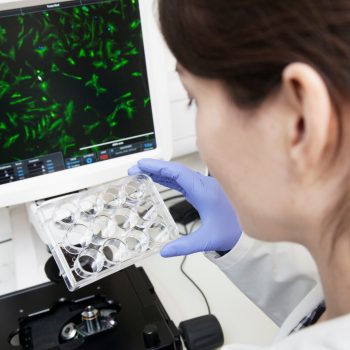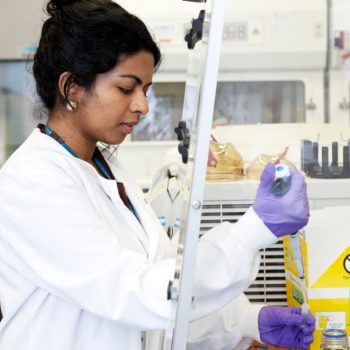Diagnosis and treatment of rare diseases given boost through grant win
A project to help with the identification, diagnosis and treatment of the one in 17 people in the UK who have a rare disease in the UK has won a £400,000 grant.
Working with five NHS Trusts, the Rare Diseases Sprint Exemplar Innovation Project aims to develop a secure cloud research platform with the potential to transform the understanding of rare genetic disorders, drive improvements in diagnosis and provide proof of principle for use in other diseases.
The goal is not just to help patients but also help the NHS save money. The cost of an undiagnosed rare disease patient is significant – whilst undiagnosed, the cost per patient is more than twice that of other patients, an average difference of £7,000 more per patient per year.[1]
This project will be funded by UK Research and Innovation (UKRI) as part of the government’s Industrial Strategy and is a collaboration between Cambridge University Health Partners and Eastern Academic Health Science Network, Privitar, and AIMES, who will be working with NHS Trusts, and the National Disease Registries at Public Health England, Microsoft Research and the Wellcome Sanger Institute to build on the National Institute for Health Research’s (NIHR) investment in the NIHR BioResource for Translational Research in Common and Rare Diseases.
The aim is to build on the advances which clinical imaging, pathology and genomic technologies have made in understanding rare diseases by creating a secure, anonymised platform to draw together and integrate data from the NHS with research data.
The project will initially involve patients with rare diseases recruited to the NIHR BioResource – a national resource of volunteers who have already provided consent that information retrieved  from their health records can be used for medical research.
from their health records can be used for medical research.
Professor John R Bradley Director NIHR Cambridge Biomedical Research Centre and Co-Chair of NIHR BioResource said: “Rare diseases can be extremely difficult to diagnose because they often have an unidentified genetic cause. Recent advances in clinical imaging, pathology, and genomic technologies have led to remarkable progress in understanding disease – particularly rare diseases, but the power of these technologies cannot be fully realised until the immense volume of data generated can be integrated with NHS data, then analysed. This is what our project aims to achieve.
“We will only be using data from patients with rare diseases who have already consented to their information being shared for research. Using the expertise of the various partners involved, we will, in a secure environment that protects the privacy of individuals, link these patients’ NHS data with their genetic data and make this combined resource available for analysis as part of approved research studies. Creating this secure research environment has the potential to transform our understanding of rare diseases, help doctors to diagnose patients much earlier, and potentially unlock our understanding of how more common diseases work. This is clearly an exciting time for everyone involved.”
Debbie, a patient from London said: “As a patient with a rare disease, I think that this is a really exciting project that will make it much easier for researchers to work on rare diseases. To really understand a rare disease – what causes it and how to diagnose, treat or prevent it – researchers need access to as much relevant information as possible on as many patients as possible. I am reassured that there is a really strong emphasis on keeping our information secure and on privacy, to prevent individuals from being identifiable by researchers, and to make sure researchers are only given the information that they need. “
The project is one of ten innovative data solutions to healthcare challenges to receive a share of £3 million Government funding following a UK-wide competition. The initiatives will see NHS, universities and companies combining expertise and using health data responsibly to drive innovation and improve health outcomes for people across the UK.
Each of the initiatives will build on best practice and will inform the future delivery of a UK-wide infrastructure for health data research and innovation. This is the first step in creating ‘Digital Innovation Hubs’ across the UK to securely and safely connect data from the NHS with genomic data and other molecular data for research. Led by Health Data Research UK – the national institute for health data science – this will unlock opportunities for scientific discovery and support the development of future treatments, increase our understanding of disease, enhance health services and ultimately improve the way we are able to prevent, detect and diagnose diseases such as cancer, heart disease and asthma.
Professor Andrew Morris, Director of Health Data Research UK said: “These ten projects from across the UK, all led by clinicians working with researchers and industry partners, will demonstrate how the trustworthy use of health data and technology can improve patient pathways, make ground-breaking discoveries quicker and put the patient in charge. We are very excited about bringing these digital projects together with public participation and support so that health data research is brought to life at scale, demonstrating public and patient benefit of digital innovation in healthcare.”
Health Minister Nicola Blackwood said: “The NHS has an unrivalled data pool – we need to work with researchers, experts and industry partners to take full advantage of this to unlock solutions to some of healthcare’s biggest challenges.
“These ten innovative projects are just the start of a technological revolution to create one of the most advanced health and care systems in the world to diagnose diseases earlier, save lives and empower patients to take greater control of their own healthcare.”
[1] https://imperialcollegehealthpartners.com/new-report-reveals-undiagnosed-rare-disease-patients-cost-nhs-excess-3-4-billion/
Written by Cambridge University Health Partners



